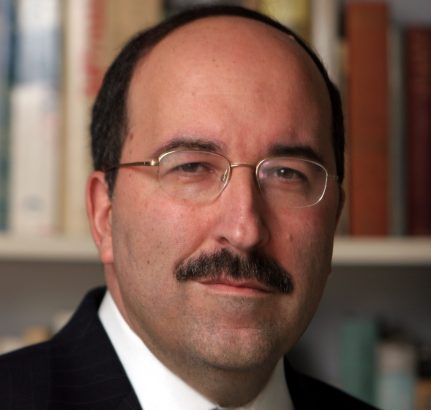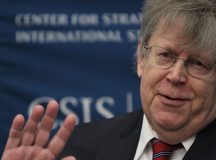To get a contrasting view on Prime Minister Netanyahu’s national security policy, Fathom deputy editor Toby Greene spoke with Dore Gold. A former Israeli ambassador to the UN, Gold is President of the Jerusalem Centre for Public Affairs, a leading security and diplomatic think tank in Israel, and has been a close advisor to Prime Minister Netanyahu over many years. He is also the author of, ‘The Rise of Nuclear Iran: How Tehran Defies the West’.
Toby Greene: One of the challenges posed to Prime Minister Netanyahu is that there is a lack of clear strategy, in particular regarding the Palestinian issue. A concern expressed is that trying to preserve the status quo will lead to disaster, or even a third Intifada. Prime Minister Netanyahu himself has said he wants to avoid heading towards a bi-national state, but in the absence of peace talks it’s not clear how he plans to meet that concern. What do you think about that criticism of Prime Minister Netanyahu?
Dore Gold: I think critics of Israel often have a short memory and they forget the actions the Israeli government has taken to try and make the peace process work, even when it has many faults. It was Prime Minister Netanyahu who moved his own position with respect to a number of key issues to try and reach out to the Palestinian President Mahmoud Abbas.
It was Prime Minister Netanyahu who accepted the idea of a demilitarised Palestinian state in his famous Bar-Ilan speech a few years back. And when it was suggested to Prime Minister Netanyahu that in order to prepare the ground for a resumption of negotiations with the Palestinians, Israel should implement a settlement freeze for ten months (a policy that no previous Israeli government had undertaken) Prime Minister Netanyahu met the challenge and actually implemented a freeze.
Finally, when Secretary of State John Kerry suggested that in order to help Mahmoud Abbas come back to the negotiating table, yet again, it would be necessary for Israel to free a large number of Palestinian prisoners, three tranches of prisoner releases were implemented by the Netanyahu government. Unfortunately, at the end of the day, it was President Mahmoud Abbas who balked at peace diplomacy with Israel.
There had been a very carefully negotiated framework agreement worked out between the United States, Israel and the Palestinians to set the stage for resuming negotiations. The framework agreement was very carefully drafted to allow each party to accept the framework with reservations. Under those terms, Israel accepted Secretary Kerry’s framework proposal. In March of 2014 when the same framework proposal was presented by President Obama in the Oval Office to Mahmoud Abbas the Palestinian answer was ‘I’ll get back to you’. In other words, Israel said ‘yes’ to peace and unfortunately the Palestinian leader said ‘no’.
We could analyse why Abbas gave a negative answer: he has competition from the Hamas movement which has gained strength; he has internal problems in the Fatah movement, with hardliners there and with Mohammed Dahlan, who seeks to oust Abbas, and is living in the United Arab Emirates at present. Regardless of the reasons why Abbas had to turn down the American peace proposal, the fact of the matter is that Israel has been on board in trying to make the peace process yield positive results. Unfortunately, we do not have cooperation from the Palestinian side.
TG: If that’s the case, obviously the threat which Prime Minister Netanyahu has articulated about the possibility of a bi-national state remains, how do we move forward? What does Israel do next?
DG: New initiatives will have to be taken after the Israeli elections, but the prime minister has hinted at a changed environment in the Middle East which could be a source of optimism. For the first time, many of the large Sunni Arab states in the region face the same identical threats that Israel faces. I’m speaking specifically about Egypt under President Sisi; Saudi Arabia, now under King Salman; Jordan under King Abdullah, and others in the region.
Because they face similar threats to Israel, from the Sunni extremists like ISIS or the Muslim Brotherhood, and secondly from Iran and its various clients in the region, these countries are more pre-disposed to quietly speaking to Israel about how to solve the region’s problems. This is precisely where creative diplomacy has to be undertaken by Israel, its Sunni Arab allies and by concerned Western governments, to build on the emerging common perspectives forming in the Middle East where the two sides face a mutual threat. This is very similar to what happened in Europe after the Second World War: former adversaries, like France and Germany, found themselves having to cooperate because they faced a much larger threat from the Soviet Union and the Warsaw Pact. There are dramatic changes occurring in the Middle East and I’m sure Prime Minister Netanyahu will be putting thought into building on those changes to create a much more stable region in the future.
TG: You referred to the framework agreement which Secretary Kerry worked on with Prime Minister Netanyahu and which was presented to Palestinian President Mahmoud Abbas in the Oval Office. According to many reports, that document included at least some reference to the ‘67 lines. Can you explain what you see as the significance of those lines in reaching a territorial agreement?
DG: Many people forget that Israel was never required to withdraw to the 1949 armistice lines – which are often misnamed ‘the 1967 borders’. It was the UN Security Council Resolution 242, adopted in the aftermath of the Six-Day War, which stated explicitly that Israel was expected to withdraw from ‘territories’ and not from all the territories. The common understanding of the US and the UK at the time was that there had to be an Israeli withdrawal, but it wouldn’t have to be a full withdrawal. And this was reflected in the language of the chief British diplomat who drafted Resolution 242, Lord Caradon, as well as by the British Foreign Secretary, George Brown. Israel received assurances from successive US administrations that it was entitled to defensible borders which would replace the fragile pre-1967 lines from which it was attacked more than 40 years ago.
TG: Do you see a solution which could meet Israel’s need for defensible borders and at least be based, or have some reference to the 67 lines, with territorial land swaps?
DG: All I can say is that Israel has to negotiate a new border with the Palestinians. Since the pre-67 lines were only armistice lines, were only military lines, governed by an armistice agreement and not real international boundaries.
In the context of negotiating those new borders, Israel will seek ways to assure that, at the end of the day, it will have secure boundaries which are defensible, given the multiple threats mushrooming around Israel at present, from ISIS to Iran.
TG: Turning to Iran, which you mentioned. Prime Minister Netanyahu frequently talks about the threat as an existential threat, which some regard as the wrong approach, projecting weakness on the part of Israel instead of strength. Why do you think Prime Minister Netanyahu speaks about the Iranian threat the way he does, do you think it’s the right language to use?
DG: I can’t speak for Prime Minister Netanyahu and what his exact thinking is. But I can put forward a number of facts which would lead any reasonable person to conclude that Iran is seeking to develop an existential threat against Israel. First, the Iranian missile programme began with the first test of the Shahab-3 ballistic missile, back in 1988, which has a 1,300 kilometre range and puts Israel in striking distance from Iranian territory. That missile became operational in 2003. In 2012, reports of the International Atomic Energy Agency (IAEA) suggested, on the basis of information they had, that Iran was seeking to remove the conventional warheads from its Shahab-3 missiles and replace them with what the IAEA described as a spherical nuclear device. Put all of that together and you have Iran seeking to have a nuclear capability to destroy the State of Israel.
But how are we to understand Iran’s intent? Not just its capabilities. For that, one has to look at Iranian military parades over the last decade, and what one sees are the Shahab-3 missiles being paraded on missile carriers. Draped on the side of those very same missile carriers are mottos in Farsi which say ‘Israel must be wiped off the map’, an expression used by Iranian leaders quite frequently. So you have Iranian capabilities pointing towards missiles which can strike at Israel, eventually with nuclear warheads, and you have Iran juxtaposing with those capabilities its own intent to destroy the Jewish state. Only a blind person would ignore the gravity of the threat which is emerging. Israel is not helpless – it has its own deterrent strength, it has worked with the United States on the only operational missile defence programme in the world, the Arrow Programme, and the Israeli government will defend its population. It must also sound the alarm of the dangers emerging from Iran – not belittle them.
I have to say I noticed a few years back that British Prime Minister David Cameron, after a meeting with the heads of MI6, spoke about Iran developing a missile capability to strike Britain as well. So this is a problem which is shared across our Western alliance, but Israel is in the front line.
TG: Do you think it projects a kind of weakness or it causes fear mongering to talk about Iran as an existential threat? Accepting, as most people in Israel do, Iran’s intent with regards to its nuclear programme, do you think that language [of an existential threat] is fear mongering?
DG: In history, there have been a number of world leaders who carefully monitored developments of their adversaries. I see Prime Minister Netanyahu operating in a very similar tradition, of making a very careful calculation about what Iran is capable of doing and what is Iran’s intent, and warning his own population as well as the world about the problem that we are about to face.
TG: Another recurring theme with respect to Prime Minister Netanyahu’s premiership are questions around his relationship with the US administration and in particular with President Obama. It has been suggested that his decision to accept an invitation to address both houses of Congress, an address which is scheduled to take place in March, without the coordination of the White House, may have caused Democrats who would have voted for a new sanctions bill against Iran to back off. In retrospect, do you think that this visit to Washington is helpful?
DG: The prime minister of Israel received an invitation from John Boehner, Speaker of the House of Representatives. If you read the invitation itself it says that it is a bi-partisan invitation, in black and white, in terms of how it is drafted. In the American hierarchy, the successor to the president is the vice president and in the case of a national emergency the successor to the vice president is the speaker of the House of Representatives. In other words, this invitation comes from one of the most powerful individuals in the United States governmental system. For the prime minister of Israel to refuse such an invitation would be a terrible mistake. More than that, it is not just permissible to come and speak to both houses of Congress, it is his national responsibility, considering the nature of the developing Iranian threat.
Just in the last six months or so, Iran has again revealed its hegemonic intent in the Middle East: deploying forces not only in Syria, where it is killing Sunni Arabs, but also large numbers in Iraq, where it says it’s trying to defend the Iraqi regime. The Iranians have also been working hard to support the Houthi rebellion in Yemen, which places them and their clients at the Bab-el-Mandeb Strait, which, like the Strait of Hormuz, is one of the key naval choke points for the movement of oil from the Middle East to Europe.
Prime Minister Netanyahu is witnessing the rise of Iranian power, the projection of their presence around the Middle East and he is fully cognisant that they are hell-bent on trying to obtain an operational nuclear weapon. I don’t know what the prime minister will precisely say in Washington, but he has to issue that warning.
If I may go back to yet the same British prime minister: back in 1946, Winston Churchill had been voted out of office. He had been invited to a small college in Fulton, Missouri, to give a speech about the current state of the world.
At the time, the United States had been a wartime ally of the Soviet Union; they used to call Stalin ‘Uncle Joe’. Prime Minister Churchill saw a rising Soviet threat emerging across Europe, and he gave a speech – on US soil, as an ex prime minister – speaking about an ‘iron curtain’ descending across Europe. He shared the speech beforehand with the Truman administration, although later President Truman denied that he had known about the content of the speech. And he came under severe criticism from the British press, who thought perhaps he was causing many people in the world to fear the Soviet Union unnecessarily. But it was incumbent upon him to warn the world of what the Soviet Union was up to at the time, or to warn the world of the nature of Soviet expansionism which had been, until that time, unfortunately ignored.
When a world leader, who is an ally of the United States, needs to express his views, it’s incumbent upon him to do so, and he has to do it with respect. The United States and Israel are allies – that alliance is unbreakable – but there are disagreements between the two countries from time to time. You have to know how to disagree and yet how to assert what you believe is a disastrous threat to both countries. Both the United States and Israel have the ability to fend off the Iranian challenge, but unless you know there is a challenge out there you can make terrible mistakes.
TG: In the context of the election campaign, another challenge to Prime Minister Netanyahu is that he is dragged to the right by Naftali Bennett and Jewish Home, which openly opposes the two state solution, which as we’ve discussed, Prime Minster Netanyahu supports. They actively promote settlement plans, even at the most sensitive moments. How do you respond to that criticism?
DG: Normally around Israeli elections there are members of the international media who believe that if the Likud gets elected the sky will fall and peace will be endangered. I remember when Prime Minister Menachem Begin was first elected and Time Magazine ran an article about him with an uncomplimentary drawing, giving him warts, and saying that you pronounce the word ‘Begin’ like ‘Feigin’. And of course it turned out that it was Prime Minister Begin who made the first Israeli peace treaty with an Arab state, namely with the Arab Republic of Egypt.
Again, people thought Prime Minister Yitzhak Shamir would lose the opportunity to begin the foundations of a peace process after the first Gulf War, but it was actually Yitzhak Shamir who went to the Madrid Peace Conference in 1991, which laid the foundations of Arab-Israeli bilateral talks. So the sayers of doom are out again, asserting that Prime Minister Netanyahu will lead a government which will evade peace and instead seek destabilisation of the region. That couldn’t be further from the truth. Likud leaders do not oppose making peace with Israel’s Arab neighbours. They simply drive a harder bargain.





































UNSC Resolution 242 clearly states: “Withdrawl of Israeli armed forces from territories occupied in the recent conflict.” This clearly states that Israel has to withdraw. It is absurd to try and falsely claim that they should not withdraw from all territories. Furthermore, to try and hide behind Lord Caradon and the US to defend this interpretation is despicable because it is a perversion of the resolution.
Another bone of contention is what Gold has to say regarding the latest failed peace talks.
He blames the Palestinians while ignoring what was on offer. Perhaps when he thought about this he was too embarrassed, realising the injustice of the proposal so he kept quiet on the matter.
The offer went something like this:
The demand for Palestinian recognition of Israel as a Jewish state.
No right of return for Palestinian refugees to their original homes,
The absorption by Israel of all the ill-defined “settlement blocs” and most of occupied Arab East Jerusalem (with the exception of the small suburb of Bayt Hanina, dubbed a Palestinian “capital”).
An indefinite Israeli military presence in the Jordan River Valley.
Continued Israeli domination of the West Bank via control of the border crossings.
Continued Israeli domination of the country’s most fertile and best-watered land.
Acceptance of economic projects bound by Israel’s suffocating mechanisms of indirect control over the Palestinian economy.
That was the setting for self-determination for the Palestinians!